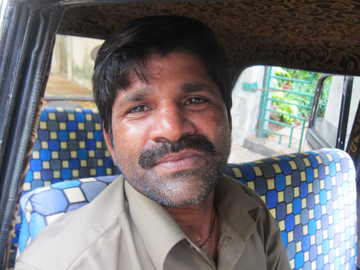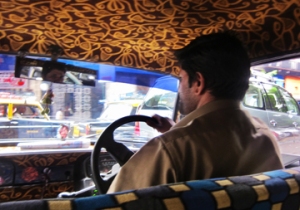It admittedly was awhile ago. After the last bomb blast. My work travel continues to deplete both my time and that extra amount of energy it takes to create. When i’m depleted, I’d rather just read. Mind feed. I was at Fort, getting printer ink and since the store is almost next to Yazdani’s, brun-maska and chai, and since Strand is near by, a browse for sustenance. And a purchase or two. I realize that a few of these conversations have started from this point. Sheshnath Tripathi. Rafiq. But this time it is Tanaji. He is Maharashtrian, from around Kolhapur. We went past VT and up Mohammad Ali Road flyover. We were deep into conversation as he openly shared about his life and arrival, when, somewhere after the Byculla flyover, I noticed that the telltale red light on the recorder wasn’t on. Somehow I hadn’t pushed start hard enough or perhaps I had pushed it twice. I turned it on and the conversation starts with this already established comfort and participation in, together, recovering this lost ground so we can continue our conversation. Click on ‘tanaji podcast’ link below to stream or right click to download. (35 min 40 sec)
tanaji: meriku bombay bahut pyara hai
This was a frisky conversation. It maybe because of the way it started, with the misfire. We became accomplices in recreating the energy that wasn’t recorded at the beginning. Capital punishment, Kasab, Osama Bin Laden, the response of the USA, love marriage, the natal family’s responsibility towards an unhappy or endangered married daughter. Tanaji and I don’t agree on anything but the discussion is thoughtful and friendly. I had no ready answer for the point he made that keeping political prisoners, or terrorists, in jail creates the vulnerability to hijacks or kidnappings where the prisoner is the barter. Here is the answer: This is no justification for capital punishment.
Tanaji is a 12th pass, HSC. He came to Bombay with the hope of a good job. But his real dream was to become a mechanic and open a garage. He took a course and got a certificate. He tried to open his garage, he found a place, but there was no money so success nahin hopaya. He can fix engines, he can fix cars. He says that if he had a garage or two today his life would be different. He might not have to be in a taxi. He might have a small flat of his own. The ‘haves’ in this country, say that their success was earned on merit and their honest sweat. Metaphorical sweat to be sure. It is hard to work up a sweat between the AC home to the AC car to the AC office, mall, store, restaurant and back. Out at the boundary, away from the pitch, the field looks different. It is full of khaddas and divets and strewn with pebbles and the ball takes these funny hops away, in random directions, this ball of opportunity. It has always seemed to be that amongst the people with privilege, and I include myself, even the most mediocre of us can find success in the world. Not so the rest, even for the most modest of dreams. (1 min 40 sec)
While we were talking Tanaji got a phone call. It was one of his regular customers that calls to book his taxi sometimes for his morning ride. A short trip in Vile Parle to somewhere in Vile Parle, but it is near Tanaji’s home and it starts his day well. Many of the taxi drivers have these regular customers. Even today, or perhaps even more so today, in this time of Meru and Mega and Easy cabs. (2 min 33 sec)
outtake phone call regular customer
So what about this conversation of ours, especially about our daughters, our endangered daughters returning home. I still think that Tanaji was making a majak with me, he was kidding me, when he said let them burn her. Wait til his daughter, the one who he speaks of so fondly, the one who is so smart and is showing so much promise, leaves his home to join another. Hopefully his patriarchal posturing will melt away. Adjustments are made to the cultural rigidities that attempt to deny women the safety of return. I only hope that his daughter, unlike so many other dutiful daughters, will realise this instead of enacting upon herself that ultimate act of hopelessness. Or stay silent and suffer, so as not to give tension to her parents, until her susaral log enact that ultimate act upon her.
In this conversation, the taxi union had just called off a strike. The government agreed to take on the idea of increasing fares and the unions. Today both auto and taxi unions are calling for strikes. The taxi union had declared 2 May for the Maharastra wide strike. The government responded by agreeing to form a new taxi trade fare committee as the union had claimed that the old Hakim committee formula was 15 years old and outdated. As of yet, the strike has not be called off. I certainly support their demand for higher fares, both the taxis and the autos. Especially the autos. In my latest round of travels, namely Coimbatore, Cochin, Chennai. Jaipur and Bangalore, our Bombay rickshaws are the cheapest. and rigged meters or not, at least they down the meter and return the change unasked. CNG is going up, food prices are going up, inflation is holding steady at just under double digits (they say). People need to eat. They need not to be making less money than they were last year or last week.
The intro music in the podcast is the song Boombai Nagari from the movie Taxi 9211, sung by Bappa Lahiri, Merriene , Nisha and Vishal Dadlani.
Music by Vishal Dadlani and Shekar, lyrics by Vishal Dadlani and Dev Kohli












































